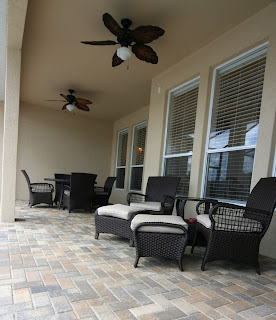Monday, May 21, 2007
Seminole Heights Historic District-Tampa, Fl
The map of the Seminole Heights Historic District shows the boundaries of the local and national districts and is used by the staff and the Architectural Review Commission ARC to help determine whether a structure is contributing or non-contributing. This determination is made using other information along with the map, such as the master site files. Do not use this map as the sole guide for determining the status of a structure.
The ARC is responsible for reviewing development within a historic district. The purpose of the ARC is to insure that the integrity of the district is maintained. The ARC focuses on exterior work on a structure, but may review the interior in certain instances.
Here's the map of the Seminole Heights Historic District
Tampa Real Estate Market Update 5/21/2007
Residential real estate practitioners look for opportunity in down market
Tampa Bay Business Journal - May 18, 2007
by Michael Hinman
Staff Writer
"The number of single-family home listings has gone down since March, which may indicate that over-priced homes are now removed from the market," said Ann Guiberson, president and CEO of the Pinellas Realtor Organization. "While year-to-year sales still show a large differential from our data, month-to-month numbers indicate that single-family home sales appear to be stabilizing."
Sales are expected to continue falling through the next quarter but start to uptick in the second half of 2007 as buyers take advantage of lower prices, officials with the National Association of Realtors said in a release. Historically hotter markets like Tampa, however, may not wait that long to move back up, so those looking to invest should do so sooner rather than later, Rogers said.
"When it turns, it's going to turn fast," she said. "It's going to catch people by surprise because you don't notice the bottom until everything starts going up again. There are too many buyers out there waiting, and they can only wait so long."
Even with sales down, people continue to move into the Tampa Bay area, even if the numbers are lower than before. Over the past year, more than 14,800 jobs were added in the region, according to Metrostudy and the Bureau of Labor Statistics. That is down from the 40,400 jobs added the year before, but Tampa and St. Petersburg were only behind Orlando and South Florida in overall job growth in Florida.
On top of that, housing starts have declined significantly with only 2,297 single-family homes beginning construction during the first quarter, off nearly 63 percent from the year before and the lowest since the first quarter of 1998.
For questions pertaining to the Tampa Bay Real Estate Market contact Rae Catanese @Prudential Tropical Realty. 813-784-7744
To receive more articles like this one subscribe to our Blog!
Saturday, May 19, 2007
It's a BUYER'S MARKET!-Tampa,FL
Are first time home buyers fearing the worst?
Wednesday, May 16, 2007
Property Tax Update-Tampa, Fl
Speaker: Florida House Set to Deliver Property-Owner Protection
Orlando Sentinel May 11, 2007Marco Rubio Special to the Sentinel
When Tallahassee turned its attention to property taxes earlier this year, the focus of the debate for many participants was centered on how much revenue government could afford to lose. Today, as we head toward a special session that promises to deliver historic tax relief, the debate is solely focused on how much taxpayers can afford to pay.
As House Republicans, we consider that newfound taxpayer focus a significant accomplishment. Over the past three months, the Florida House of Representatives has promoted a bold idea on how to confront our state's biggest problem: unaffordable and unfair property taxes.
Our goals were simple: reduce local government taxing and spending, provide significant and immediate relief to taxpayers, and give Floridians statewide the opportunity to vote for meaningful and comprehensive property-tax reform. We were consistent throughout the debate. Whether our idea or not, we would support any plan that met those three goals and was more focused on the taxpayer than the tax collector.
During the past few weeks, Rep. David Simmons, a Republican from Maitland, suggested an idea that met the House's policy goals, and offered an opportunity for opponents of the House plan to reconsider their objections. The House is now considering a variation of his idea of dramatically increased homestead exemptions based on a percentage of the value of the home. We think this approach is fair and simple, and eliminates many of the inequities that have developed under our current property-tax structure.
Here is an example of how this approach might work: On the home's first $300,000 in just value, 80 percent would be exempt from property taxes. On the next $700,000 in just value, 70 percent would be exempt. On just value above $1,000,000, 30 percent would be exempt. Under the numbers used in the example above, the new homestead exemption for a $300,000 home would be $240,000. Using the example above, 90 percent of all homestead property owners would benefit more from this proposal than under the current Save Our Homes structure. The average beneficiary of this approach would see his or her tax bill cut in half. Non-homestead-property owners would also benefit from this approach. Both non-homestead residential properties and commercial/industrial properties would also be exempt on a percentage of their just value and would see property-tax savings.
This approach works well because it delivers targeted cuts to those who need it most. Floridians who have been hurt the most by outrageous property-tax increases will see the greatest relief. Further, by fixing the size of the homestead exemption to the value of property, we will eliminate the problem of many Floridians who are trapped in their current homes by the threat of skyrocketing tax bills if they move to a new home. This would be a great step for our seniors, growing families and first-time home buyers.
There are those who believe that taxes should be set by government determining how much government needs and then asking taxpayers to figure out how to pay for it. That kind of antiquated thinking is what got us into this crisis to begin with. A new consensus is emerging in this debate: First, let's have taxpayers decide what they can afford to pay in property taxes, and then government must do the best it can with what taxpayers can afford to send them. Family budgets are tight, and government needs to start setting realistic priorities with the money it is given, just like our families do every month.
Heading into a special legislative session in June, our goal today is clearer than ever: The next time taxpayers get a property-tax bill, it must be one they can afford to pay. If we can achieve that measure, then I believe Floridians will judge our work a success.
Marco Rubio, a Republican from West Miami, is the speaker of the Florida House of Representatives. He wrote this commentary for the Orlando Sentinel.
To receive more articles like this one subscribe to our Blog!
Monday, May 14, 2007
Hillsborough County housing statistics and trends 2008-Tampa, Fl
2008 Economic Report-Tampa Real Estate
Dr. Lawrence Yun, NAR Chief Economist gave a speech last week at the Greater Tampa Association of Realtors in Tampa. Myself, along with 200 other Real Estate agents attended the informative lecture.
His main focus was to let Realtors know to inform clients that our Tampa Real Estate Market is NOT the same as the National Market. National figures and statistics are much different. He emphasized the importance of buyers and sellers to contact an agent who can provide detailed information for specific neighborhoods, and to compare sold, list pricing and days on market on each community.
Read full story 2008 Economic Report-Tampa Real Estate
For questions related to selling your home in the Tampa Bay area contact Rae Catanese, Prudential Tropical Realty-813-784-7744 or email: realtyrae@yahoo.com
To receive more articles like this one subscribe to our Blog!
Enter your Email Address
Powered by FeedBlitz
Tuesday, May 08, 2007
Selling Your Home in a Slumping Market-Tampa,FL
Selling Your Home in a Slumping Market 
RISMEDIA, May 8, 2007-When your local housing market is in a free fall and you have to sell, what do you do? You want top dollar, you may also need to sell in a hurry, especially if moving day is right around the corner.
In a tight housing market, remember that you are competing with all of the other homes for sale in your neighborhood. The key to success is to make your home and the deal itself more attractive than what the competition is offering without giving away too much.
If you find yourself having to sell into a slow market, here are some tips to help you make your home more attractive and sweeten the deal to generate more interest in your home:
- Price it to the market, don't be greedy. Most sellers tend to set the price too high, thinking their home is worth more than it really is. Check the sales prices of comparable homes that recently sold the asking prices of comparable homes that are currently for sale in your neighborhood.
- Obtain an appraisal in advance, so you know what the house is officially worth (based on the appraiser's professional opinion).
- Use a seasoned Realtor, a veteran who has already experienced price wars in the housing market. According to the National Association of Realtors, a home sells on average for 16 percent more when the seller uses as certified Realtor.
- Have your home professionally inspected before showing it. Get everything repaired so lookers won't have an excuse not to buy.
- Have your home professionally staged. A professional stager can transform an empty or overly cluttered house into a warm and welcoming home.
- Don't move out before it sells, or if you have to move out, make sure you leave the home staged, so it looks lived-in. Vacant houses feel more like uninhabited caves than homes.
- Be willing to pay closing costs for the purchaser, up to 6%. A slow market is usually that way due to a slow economy. Buyers are strapped for cash and may need you to help in some way with the financing.
- Give your Realtor copies of all improvements to the home and any guarantees for anything like a new roof, furnace, or hot water tank.
- Make sure your Realtor is marketing your home on at least eight Internet sites, including Craig's List and Backpage.
- Realtor commissions are negotiable. Consider offering a higher commission to your Realtor as an added incentive
- Keep your home in ready-to-show condition at all times. Do not require a 24-hour notice.
- Focus on curb appeal and making a good first impression. You do not get a second chance to make a good first impression.
- Be open to negotiating on things like leaving furniture or appliances behind.
- Although you may be tempted to take the first offer that comes along, be careful. Not all offers are created equal.
Here are some warning signs to watch out for:
- Someone tells you to take your house off the market for a period of time, and in exchange, the person will pay you more than the asking price later. This is usually a sign that the person plans on using your home as part of a mortgage fraud scheme in which he obtains a loan for more than the house is worth, pays you a little more than what you were asking, and pockets the excess proceeds.
- A cash back at closing deal in which the person offers you more than the home is worth if you agree to kick back the extra money at closing.
- The buyer is not pre-approved for a mortgage loan. This person can tie up your home, preventing you from considering better offers.
- The person is offering no or very little Earnest Money Deposit. The lower the EMD, the more likely the deal will fall through.
- The prospective buyers make the purchase agreement contingent upon their home selling, and for that to happen, several other transactions must occur first. This is known as the domino effect, and you should avoid it, if possible.
You can successfully sell a home into a declining market and even profit from the sale, if you set realistic goals and work a little harder at it than your competitors. Just remember to work hard, stick to it, and avoid some of the common pitfalls described in this article.
For questions related to selling your home in the Tampa Bay area contact Rae Catanese, Prudential Tropical Realty-813-784-7744 or email: realtyrae@yahoo.com
To receive more articles like this one subscribe to our Blog!
Tuesday, May 01, 2007
Condo Update-Tampa, Fl
Condo Saturation Soaks Developers
By SHANNON BEHNKEN The Tampa Tribune
Published: May 1, 2007
TAMPA - Condos For Sale. The loud signs flaunted from street corners across the Bay area are meant to grab the attention of potential buyers.
Developers advertise slashed prices and promise flat-screen TVs and computers. They put up inflatable gorillas and even pay people to dress as superheroes at busy intersections. All the hype hasn't worked.
The white-hot trend to change apartments into condominiums has long passed, and developers that overestimated the demand have found themselves with half-empty complexes. Some that tried converting them back into apartments aregrappling with foreclosure. Others are turning in their keys, leaving the lenders with unwanted residential properties they're trying to sell themselves.
For individual buyers who purchased condominium units, they now must deal with uncertain property values and a less-than-promised quality of life: living in the middle of a sparsely filled complex where the majority of their neighbors rent.
Eddie Flom, who has worked with developers on conversion projects in the Tampa Bay area, sums up the situation in one word: greed.
"It's the oldest thing in the American economy," said Flom, of Flom Equities LLC. "Greed, greed, greed overcomes wisdom."
Apartment-to-condominium conversions started locally in the late 1990s and heated up in late 2004 as some developers saw a way to get around high land costs and offer more affordable homes. Units at some apartment complexes, particularly the higher-end ones, sold out quickly.
A handful of developers made so much money, Flom said, that others took notice and jumped onboard. Some of the less experienced developers paid too much for the land and couldn't sell condos for enough to make a profit. "People were trying to make a quick buck off the boom," he said. "Now Tampa is in complete saturation mode."
By 2005, the conversions led to a shortage of apartments as 18,000 rental units were turned into condos, and the occupancy rate at the remaining apartment complexes swelled to 98 percent, according to commercial real estate firm Cushman & Wakefield.
During the same year, 68 apartment complexes were purchased for conversion in the Bay area, up from 11 in 2004, according to New York-based Real Capitol Analytics, which tracks real estate trends. The conversion craze dropped off just as quickly as it heated up. In 2006, 25 complexes were sold for conversion. So far this year, there have been zero.
"It's going to take at least a couple of years to burn off all the supply we have," said Dan Fasulo, a company spokesman.
Looking to get a great deal on a condo or home in Tampa? Contact us!
To receive more articles like this one subscribe to our Blog!
Enter your Email Address
Powered by FeedBlitz









